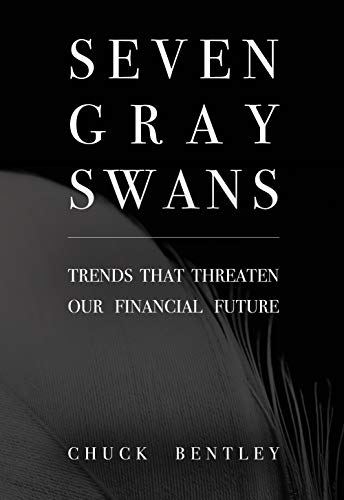‘Seven Gray Swans’ That Might Financially Challenge You in 2021
The coronavirus pandemic has produced the need to make so many adjustments to our lives over the last 10 months that it is sometimes hard to keep up with our new reality. The need to work remotely for so many, online learning for our students, and even dining out have become downright challenging at times.
Paramount to these adjustments is how to practically manage our money in these uncertain times without going broke. As Christians, how do we continue to provide for our families, give generously, save for the future, and get out of debt without taking a COVID-fueled false step?
In his latest book, Seven Gray Swans: Trends That Threaten Our Financial Future, author Chuck Bentley unpacks seven potential threatening financial events that are considered unlikely but could still happen in 2021 nonetheless. In doing so, the Crown Financial president provides effective ways to prepare for and survive what he calls a “Gray Swan” event.
I recently spoke with Bentley about why it is so critically important to follow God’s principles regarding personal finances in times like this, what a gray swan is, and he describes a few monetary trends that we may need to navigate in 2021.
For starters, what advice would you give someone regarding their personal finances during this period of COVID-19 that we are in?
Well, I think it's obviously going to go on longer than any of us expected or had hoped for it to. It requires quite a bit of adjustment. Adjustment in our thinking and adjustment in how we manage our resources. I think we obviously all need to be sort of driving around the track under the yellow caution flag. There's certainly a great deal of risk related to COVID and the lockdown. I've been giving people advice for 2021, really on three simple tips. Number one is to give more in 2021 than maybe you did last year. I think that giving is essential during a crisis. It's a distinguishing factor of our faith in God, that we trust him to provide for tomorrow. We need to look for ways to give, not just financially, but also of ourselves, of our time, of all the resources that we have to help other people who may not be getting through this as well as we are.
Secondly, it's a year to save more. Look for ways to be frugal. I'll give you a real practical example of that. My wife and I are using the library only for our books. For years, if we wanted a book, we downloaded it on a Kindle or we ordered it from Amazon and had it shipped to us. And now we're discovering that the library can get us just about anything we want. It saves us a lot of money and those purchases, but we're looking for ways, not just to live a minimalistic lifestyle, but to be careful and cautious with every dollar we spend. This is so we can have more margin and not be fearful about our giving. And then finally, I think it's a year to invest wisely. The environment is a red hot for investment right now of all sorts. We're looking back after a $2 trillion stimulus last year and 0% interest rates. We’re seeing the market is soaring, real estate is soaring, bitcoin is soaring, and gold is soaring. It's an interesting time for investors. I think as Christians, we should be investing very wisely right now.
Why is it so critically important to follow God’s principles in regard to finances during times like this?
God's principles are the principles that put our house on solid rock. The principles of the world will fail us and disappoint us. They are not reliable. God's principles are timeless. They are proven. They are good for us. They're written for our benefit. When I apply God's principles, I experience less stress, less fear, and less anxiety. I typically have better results, although not all the time. The principles protect not only my wallet, but they also protect my heart.
Most of what God says about money is what we should believe about it. He tells us to avoid greed, to avoid hoarding, and to avoid coveting. All those things address me. They address my view of money, how I handle it, and how I think about it. And when those issues are correct and those issues are right, then we become much better managers or stewards of whatever God gives us. And He basically says, if you're faithful to me, I'm going to entrust you with more. And so I have to work on my faithfulness part and God does the increase once I become more faithful to Him.
You have a new book called Seven Gray Swans. What was your inspiration or catalyst for writing it?
Larry Burkett, who started (Crown Financial) in 1976, wrote about the economy and warning believers and Christians worldwide to be cautious. He encouraged people to use God's principles, to be prepared for an uncertain future. One of his all time, bestselling books was The Coming Economic Earthquake. I've had lots and lots of requests through the years to update that book, and I decided that I really didn't want to update it, to just sort of coast on Larry's coattails,
because I'm not Larry and times have changed significantly since then. As I began to analyze my own perspective, I have this sort of inherent dashboard that I watch for trends and keep an eye out. I decided to give myself permission to write in my own style, my own voice, and to express my own concerns about what I see on the horizon. So, that's where the seven gray swans came from.
For those who don’t know, what exactly is a gray swan? There is obviously the waterfowl of a certain color, but I think you are talking about something different.
I'm contrasting it to the popularized economic term called a black swan. A black swan is an unknown event that cannot be forecast that has very negative consequences. We've seen black swan events. We can look back in history and say, well, we never saw that coming. We weren't prepared. But in contrast to that, a gray swan is some risk that we can identify, we can be prepared for, but we tend to ignore them. I think because they're out in plain view, we think, okay, I see that, but I'm not really worried about it. So I'm not going to do anything about it. That's what I call a gray swan.
What would be an example of a gray swan in the financial sector?
The 2008 - 2009, great financial crisis or the great recession when the U.S. economy nearly imploded. By their own audit and by their own financial report, it was identified as a known risk, but was ignored by experts. Very few people thought it could. We knew the risk was great, but very few people thought it would ever happen. So, people found themselves unprepared. And there were signs that our economy was at risk due to subprime mortgage lending. The very foundation of our economy is home ownership. And we had so many houses financed by people who could not afford them. The idea was that if that ever started backwards, if we ever started a cascading downward trend of foreclosures and people losing their homes, that it would put the whole global economy at risk because so many of the instruments on Wall Street were counting on that as sort of a bedrock sure bet. And that's exactly what happened. We cascaded downward and it spiraled out of control until the U.S. government had to step in and backstop it into our collapse of the American economy. That's considered a gray swan because we knew the risk was there, but we ignored it.
You write about so many fascinating topics including modern monetary theory, universal basic income, and American democratic socialism. Of the gray swans you write about, is there one that you consider to be the most critically significant?
What I'm really concerned about right now is this idea of social scoring. Social scoring started in China, where you are now evaluated and measured by how you behave as a citizen and what you post online. All of those things are aggregated into a score, which allows you access to travel, access to credit, access to entry into other buildings, or even to receive government tax refunds or government subsistence payments. It's a form of controlling free speech. And what we're seeing develop in America is that corporations are implementing their own social scoring. I can't get on an Uber if I have a low score. Well, who gave me the low score? The driver of the Uber. That's happening whether you want to rent a home, or what you post on social media. That is clamping down on our free speech. I think once we lose the ability to have free speech, we're going to lose a great deal of the freedom that we've always enjoyed, even to spread the Gospel. It’s a gray swan that I have heightened concerns about right now. We're seeing unprecedented moves of censorship among big tech.
Final question, after people have read Seven Gray Swans what would you like your readers to take away from that experience? What is your greatest hope for the book?
I used the scripture that “the prudent see danger and take refuge. The foolish plunge ahead and suffer harm.” (Proverbs 27:12) I want people to become prudent in their critical analysis. This is something I call scenario analysis. When we become prudent, it means we avoid spontaneous kinds of foolish decisions that are driven by our emotions or fear. And prudence means we chart out a path for the best action and we have the courage to take action. A gray swan often makes you feel paralyzed. You just simply don't know what to do, and therefore you become a victim of your circumstances. I think we can become people like the men of Issachar who understood the times and knew what Israel should do. If we really are aware, then we can make wise decisions and navigate our way through this. Secondly, I hope people engage in tracking gray swans themselves. I hope they will share those ideas with me, and we can sort of keep a running communication going of what they see happening and how they see a better way to navigate through it. And possibly we can keep this updated to where we're serving a very useful, practical service to the body of Christ at this time.
To Purchase Seven Gray Swans: Trends That Threaten Our Financial Future:







